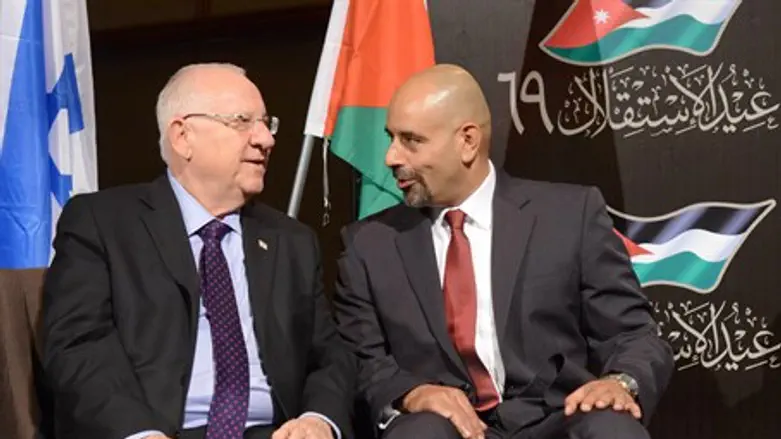
Despite recent tensions between the neighboring nations, President Reuven Rivlin on Tuesday evening celebrated Jordanian Independence Day at the Jordanian Embassy in Tel Aviv by giving glowing praise to the Hashemite Kingdom.
He began by speaking in Arabic, sending his regards to the Jordanian King and Queen and all the citizens of Jordan, which the British established by fiat in 1946 when they created a kingdom for Abdullah I of Saudi Arabia.
Rivlin then switched to English, saying, "Jordan is an island of stability in a very complicated region. I have watched with wonder, the very sensitive and wise way Jordan deals with the challenges and changes in our region."
"Since Israel and Jordan signed a peace agreement, there has been enormous growth in cooperation; in economic and social areas, and in ground-breaking ideas and initiatives; like the Red Sea-Dead Sea Canal project. I do hope we will be able to increase this cooperation to bring benefit to all the people of our region," he added.
The president diplomatically ignored the fact that Jordan has actually threatened on several occasions recently to revoke the peace treaty, which was signed in 1994, so as to pressure Israel to allow the Jordanian Waqf to continue denying Jews their rights to pray at the Temple Mount, which has been left under the Waqf's de facto authority since being liberated from Jordanian occupation in the 1967 Six Day War.
Rivlin went on to make a familial revelation, saying, "my late father was a great scholar of Islam. His Muslim friends told me, that he fasted during Ramadan when visiting his Muslim friends, only because of the deep respect he felt for his Muslim friends and neighbors. I grew up learning about the rich world of Islam, that is full of beauty, kindness, and mercy."
"May I wish you all many more happy independence celebrations. As we approach the Ramadan fast, I send my blessings to all the people of the Kingdom," concluded the president.
Jordanian Ambassador to Israel Walid Obeidat then spoke. Obeidat was recalled to Jordan last November until February in an act of protest over talk in Israel of allowing Jews to pray on the Mount, which is the holiest site in Judaism.
"The vision and courage of both late leaders Prime Minster (Yitzhak) Rabin and King Hussein, permitted our two countries to sign an historic agreement which confirmed the end of belligerency and ensured mutual recognition, political independence and established diplomatic relations," said Obeidat.
He added, "this year we have seen the advancement of major cooperation projects in the fields of water and energy."
Openly sour relations
Despite the friendly tone of the event, relations with Jordan have been become openly sour of late.
Last November the Jordanian parliament held a special prayer session for the two Arab terrorists who committed a brutal attack on a Jerusalem synagogue, murdering four Jews at prayer and beheading two of them, as well as murdering a police officer.
Jordan's Prime Minister Abdullah Nsur also sent a letter of condolence to the families of the two murderous terrorists. Aside from its threats regarding the Temple Mount, Jordan also has been leading the Palestinian Authority's (PA) "diplomatic war" against Israel at the UN.
Jordan itself is made up of a majority of Palestinian Arabs, and nearly all Arab residents of Judea and Samaria hold Jordanian citizenship, leading many to suggest creating a "Palestine" in Jordan.